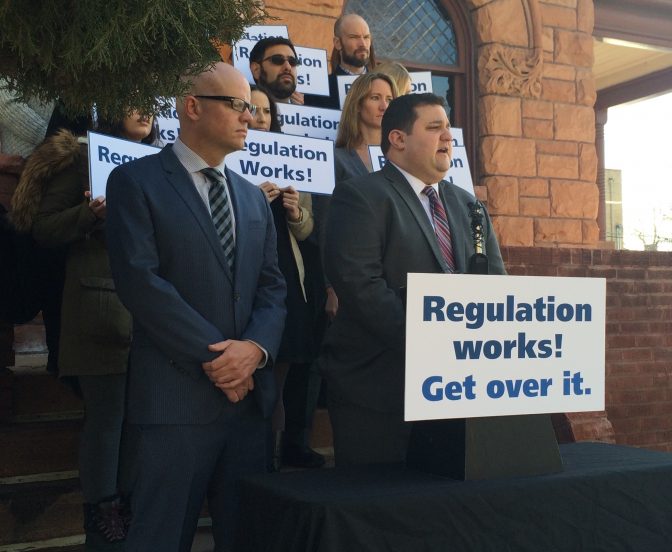Freedom Leaf Interview: Mason Tvert of the Marijuana Policy Project

Interview by Steve Bloom and Chris Goldstein
As Director of Communications at the Marijuana Policy Project (MPP), Mason Tvert gets around. Born in Scottsdale, Ariz., he attended the University of Richmond in Virginia before relocating to Colorado, where he founded Safer Alternative for Enjoyable Recreation (SAFER), which posited that marijuana is safer than alcohol. He spearheaded the campaigns to legalize cannabis in Denver in 2005 and, with Amendment 64, throughout the state in 2012. Following that victory, he was hired by the MPP, which is currently working on legalization initiatives in Nevada, Maine and Rhode Island, on a medical marijuana initiative in Ohio and on the legislative effort in Vermont.
Let’s talk about Colorado. What are the biggest changes you see in Colorado now that marijuana is legal?
Public attitudes toward marijuana have clearly shifted, and that was our goal when we started working in Colorado. We wanted to increase the percentage of people that recognize that marijuana is safer than alcohol and get people to start thinking of marijuana as just another product that countless adults choose to use and should be allowed to use responsibly. The stigma has broken down quite a bit, and people seem far less worried about discussing marijuana with their friends, family members, coworkers and even strangers. It’s really starting to be treated more like alcohol.
Would you do anything differently if you could rewrite Amendment 64?
Not really. Perhaps I’d include some clarification about what constitutes “open and public” to prevent localities from adopting overly broad definitions, as Denver did to prohibit social use. Generally speaking, Amendment 64 accomplished exactly what it was supposed to accomplish: It ended prohibition and replaced it with a system in which marijuana is regulated and taxed, and which will continue to evolve so that marijuana is treated more and more like alcohol as people adjust to it.
Speaking of social use, how do you see that evolving,  especially in states looking to take up the issue in 2016?
especially in states looking to take up the issue in 2016?
As more and more people recognize that marijuana is less harmful than alcohol and agree that it ought to be treated that way, we’ll see support grow for allowing social use. Once a state or locality gets over its fear of marijuana itself and makes marijuana legal for adults, citizens will be more inclined to agree that there need to be places where adults can use it safely and legally. Those discussions are now occurring in Colorado, Oregon, Washington and Alaska. Ballot initiatives and legislative proposals are also becoming more specific in addressing the issue.
Also related to the social-use issue, High Times was recently rejected from holding the Cannabis Cup at the Denver Mart and withdrew an application to stage the event in Pueblo. Is this good or bad news for Colorado?
The Cannabis Cup would likely draw a lot of tourists to town, and have a significant and positive economic impact on our state, so it’s unfortunate that it was canceled. The Great American Beer Festival takes place in Denver each year, and is considered a huge tourist attraction, a big economic booster and a good time for adults who consume the products the event highlights. The same could be said for the Cannabis Cup when it comes to marijuana consumers, and the event ought to be treated the same. Sadly, there are still plenty of city officials and others who embrace alcohol yet dislike marijuana, and go out of their way to treat it differently.
How can states be convinced that edibles won’t cause the same problems that have occurred in Colorado regarding dosages?
Lawmakers are coming around to recognize the benefits of regulating marijuana, and the harms of prohibition. Sometimes it takes them longer to apply those same lessons to certain types of products, as we’re seeing with edibles in some states. My hope is that states that do allow them, such as Colorado, will continue to iron out their regulations until the point that the benefits of regulating edibles, and the problems associated with prohibition, can no longer be ignored.
A legislative team from Massachusetts recently traveled to Colorado to visit retail stores and meet with local law enforcement. Their report advised to not legalize marijuana in Massachusetts. Were you surprised?
It seemed pretty clear, based on the news reports, that these legislators already opposed legalization prior to making the trip to Colorado. Many lawmakers who make these trips tend to spend a lot more time meeting with law enforcement officials and others who opposed—and often still oppose—Colorado’s marijuana law than they spend meeting with officials who are supportive or neutral. Whenever we learn of legislators or other opinion leaders visiting Colorado, we do everything we can to make sure they’re getting both sides of the story.
In March, the Supreme Court refused to take up the lawsuit from Nebraska and Oklahoma against Colorado over legal marijuana. Why is that significant for Colorado and the other states?
The Supreme Court’s decision was not really based on the merits of the case, and was instead based on the procedure and questions regarding the plaintiffs’ standing. It’s significant that the Obama administration and the Colorado state government both urged the court to dismiss the case. And it’s significant that the court decided not to go out of its way to oppose state-level marijuana policy reform.
The MPP is supporting AUMA in California. What do you think is the likelihood that it will pass, and if it does, what are the implications of the largest state in the nation legalizing marijuana?
I think AUMA has a very good chance of passing. California is a very large and very diverse state, so it will surely reinforce the notion that public attitudes toward marijuana are shifting. Also, given the size of the state, it will lead to the creation of countless jobs, generate commerce for all sorts of other industries and produce significant tax revenue, all of which should pique the interest of state and federal officials around the country. And because California has a long history of being fertile ground for innovation with regard to both cannabis and technology, we can expect to see a lot of ideas come out of the state that could have an impact on the broader marijuana industry.
In March, Maine rejected the legalization initiative submitted by the MPP. You’re suing to get that ruling overturned. What do you expect will happen?
The Maine campaign followed the law and collected more than enough valid signatures to qualify for the ballot. The Secretary of State improperly invalidated more than 17,000 signatures of registered Maine voters, and by doing so they’re wrongfully denying citizens their constitutional right to vote on the measure. We’re hopeful that the judge will agree.
The Nevada ballot measure doesn’t allow for home cultivation by adults unless they live more than 25 miles from a retail store. What’s the strategy behind that language?
While the initiative was being drafted back in early 2014, there were significant concerns about the level of public support for allowing home cultivation. The drafters worried that allowing it could result in the measure failing, but they also recognized that there needs to be some form of legal access for adults in the state in order to eliminate the underground market. They decided that adults must at least be allowed to grow their own marijuana if they live in an area that doesn’t allow for marijuana stores. Home cultivation rules, like possession limits, are one of those things that will surely continue to evolve along with public attitudes.
While many states are moving ahead with legalization, there’s little to no movement from the federal government. Which do you favor: rescheduling or de-scheduling marijuana?
While we’ve yet to see passage of sweeping legislation, we’ve seen a significant growth in support in the House and the Senate, with the passage of multiple marijuana-related appropriations measures. While these are not permanent or ideal, they mark a massive shift in how marijuana is being viewed by members of Congress. As more and more states adopt laws making marijuana legal for adult use and/or medical purposes, we’ll continue to see growth in support at the federal level. This gridlock isn’t entirely unique to marijuana, and it’s also just symptomatic of a deeply divided federal political system. The Marijuana Policy Project fully supports removing marijuana from the federal drug schedules entirely. Schedule II, while an improvement, is not remotely good enough.
The MPP gives Bernie Sanders an A rating in its Presidential Candidates’ Guide. Hillary Clinton has a B rating, Donald Trump has a C+ rating and Ted Cruz has a C rating. What would happen to marijuana policy, depending on which of these four get elected?
All four candidates have said they believe states should have the right to establish their own marijuana policies, and, given the number of states that have—and will have—adopted their own marijuana policies by the time a new president takes office, we shouldn’t expect to see any sort of major efforts to roll back the progress that’s been made. Sanders has expressed support for removing marijuana from the federal drug schedules, and Clinton has said she thinks it should be rescheduled at the very least, but it remains unclear whether they could do it without action from Congress. It appears that both Democrats and Donald Trump strongly support the rights of seriously ill people to use medical marijuana, so it’s quite likely we’d see any of them support at least some shift in marijuana’s classification.
What’s on the MPP’s agenda beyond 2016?
MPP will work on implementing whatever laws pass this year, in addition to working on passing laws in even more states. We plan to support legislation that would legalize and regulate marijuana for adult use in states like Delaware, Hawaii, Maryland and New Hampshire, as well as support the creation of a regulatory structure in Washington, D.C. We also want to pass medical laws in any states that fail to pass them this year, such as Utah; we’ll have to wait and see what happens in Nebraska, Pennsylvania and other states. We will also be ramping up efforts in Congress to build support for significant and permanent legislation, in addition to the appropriations measures we’ve seen pass over the past couple of years.
For more on the MPP, go to mpp.org.
If you enjoyed this Freedom Leaf article, subscribe to the magazine today!

